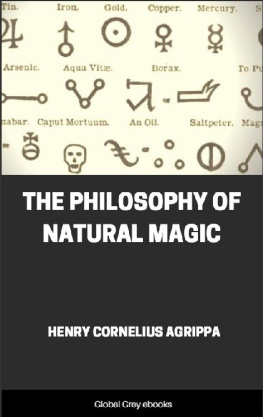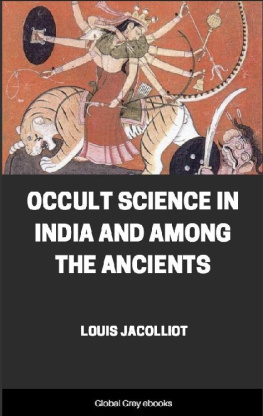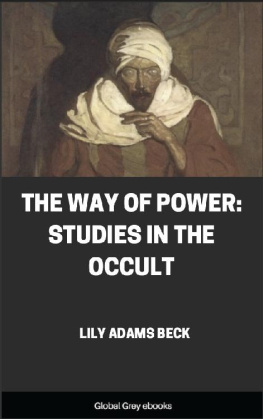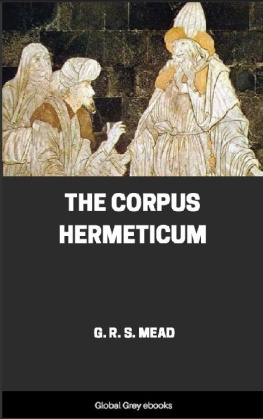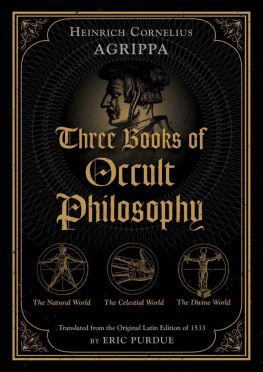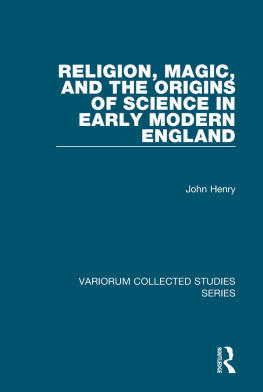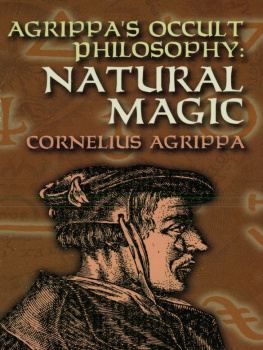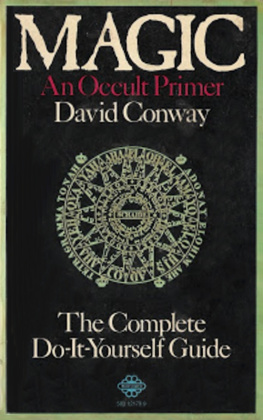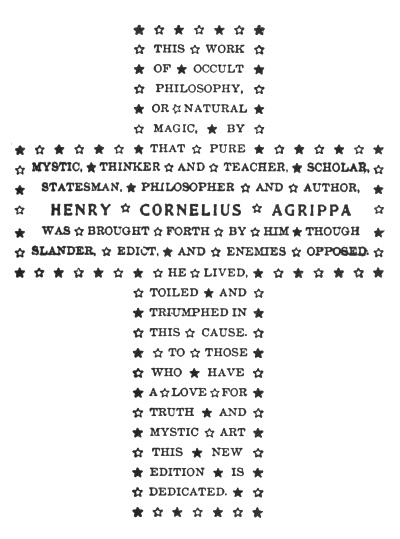THE PHILOSOPHY OF NATURAL MAGIC
BY
HENRY CORNELIUS AGRIPPA
VON NETTESHEIM
COUNSELOR TO CHARLES THE FIFTH, EMPEROR OF GERMANY, AND JUDGE OF THE PREROGATIVE COURT

OFFICIAL EDITION
A COMPLETE WORK ON
Natural Magic, White Magic, Black Magic, Divination, Occult Binding, Sorceries, And Their Power. Unctions, Love Medicines And Their Virtues. The Occult Virtue Of Things Which Are In Them Only In Their Life Time, And Such As Remain In Them Even After Their Death. The Occult Or Magical Virtue Of All Things, etc.
1913
The Philosophy of Natural Magic By Henry Cornelius Agrippa.
This edition was created and published by Global Grey
GlobalGrey 2018

globalgreyebooks.com
Contents
Agrippa
Mr. Henry Morley, an eminent English scholar, in his Life of Cornelius Agrippa, makes these tributary statements:
He secured the best honors attainable in art and arms; was acquainted with eight languages, being the master of six. His natural bent had been from early youth to a consideration of Divine Mysteries. To learn these and teach them to others had been at all times his chief ambition. He is distinguished among the learned for his cultivation of Occult Philosophy, upon which he has written a complete work.

Sublime Occult Philosophy
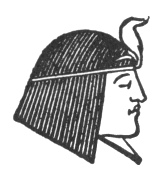
Judicious Reader: This is true and sublime Occult Philosophy. To understand the mysterious influences of the intellectual world upon the celestial, and of both upon the terrestrial; and to know how to dispose and fit ourselves so as to be capable of receiving the superior operations of these worlds, whereby we may be enabled to operate wonderful things by a natural powerto discover the secret counsels of men, to increase riches, to overcome enemies, to procure the favor of men, to expel diseases, to preserve health, to prolong life, to renew youth, to foretell future events, to see and know things done many miles off, and such like as these. These things may seem incredible, yet read but the ensuing treatise and thou shalt see the possibility confirmed both by reason and example.J. F., the translator of the English edition of 1651.
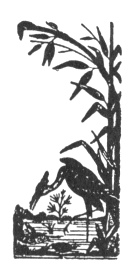
Preface
In the last half of 1509 and the first months of 1510, Cornelius Agrippa, known in his day as a Magician, gathered together all the Mystic lore he had obtained by the energy and ardor of youth and compiled it into the elaborate system of Magic, in three books, known as Occult Philosophy, the first book of whichNatural Magicconstitutes the present volume. Agrippa published his Occult Philosophy, with additional chapters, in 1533. The only English translation appeared in London in 1651. It is a thoroughly edited and revised edition of this latter work that we produce. Some translating has been done and missing parts supplied. The reader is assured that while we have modified some of the very broad English of the seventeenth century, that he has a thoroughly valid work. Due care has been taken to preserve all the quaintness of the English text as far as consistent with plain reading. We have endeavored to do full justice to our author, the demands of those purely mystical, and the natural conservatism of the antiquary and collector. In this we believe we have fully succeeded.
The life of Agrippa, up to the time of writing his Occult Philosophy, is also given, drawn mostly from Henry Morley's excellent life of Cornelius Agrippa.
That part of the volume credited to Mr. Morley maybe designated as an honest skeptic's contribution to Mysticism, and his chapters are produced entire, as justice to both him and Agrippa cannot be done otherwise, and they are an especially valuable part of Mystic literature.
The table of the Cabala, newly compiled for this volume, will be found to possess superior features over all others.
Following the above we give a chapter on the Empyrean Heaven, which will explain much that our author has written. It is derived mainly from an old occult work on "Physic."
The Symbols of the Alchemists will be found both useful and instructive. The chapter on the Magic Mirror, which ends the work, is believed to be the best contribution on the subject extant.
All the original illustrations and some new and selected ones will be found, as also various etchings of characters. That one on the Empyrean Heaven contains, we have cause to believe, some of the very hidden knowledge relating to the Lost Word. It is a much older plate than the work it was taken from.
Some parts of the volume will interest those who love to work out hidden things.
The editor conveys his warmest thanks to those friends who have encouraged him in the workon the Cabala table, the illustration of the Grand Solar Man and the translatingoutside of which he has not asked or received any help. This being the case our friends will please excuse any particular thing that may not sound pleasantly to the ear.
Early Life Of Cornelius Agrippa
At Cologne, on the 14th of September, 1486, there was born into the noble house of Nettesheim a son, whom his parents called in baptism Henry Cornelius Agrippa. Some might, at first thought, suppose that the last of the three was a Christian name likely to find especial favor with the people of Cologne, the site of whose town, in days of Roman sovereignty, Marcus Agrippa's camp suggested and the colony of Agrippina fixed. But the existence of any such predilection is disproved by some volumes filed with the names of former natives of Cologne. There were as few Agrippas there as elsewhere, the use of the name being everywhere confined to a few individuals taken from a class that was itself not numerous. A child who came into the world feet-foremost was called an Agrippa by the Romans, and the word itself, so Aulus Gellius explains it, was invented to express the idea, being compounded of the trouble of the woman and the feet of the child. The Agrippas of the sixteenth century were usually sons of scholars, or of persons in the upper ranks, who had been mindful of a classic precedent; and there can be little doubt that a peculiarity attendant on the very first incident in the life here to be told was expressed by the word used as appendix to an already sufficient Christian name.
The son thus christened became a scholar and a subject of discussion among scholars, talking only Latin to the world. His family name, Von Nettesheim, he never latinised, inasmuch as the best taste suggested thatif a Latin designation was most proper of a scholarhe could do, or others could do for him, nothing simpler than to set apart for literary purposes that half of his real style which was already completely Roman. Henry Cornelius Agrippa von Nettesheim became therefore to the world what he is also called in this narrativeCornelius Agrippa.
Next page
